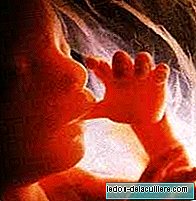
Valentine is approaching and it is a special moment for many couples that day they want to celebrate especially love and desire that unites them. But when they are parents, there may be situations that make the expression of those feelings more complicated.
To talk about all that we will continue today interviewing the psychologist Mónica Serrano. We will address the emotions and thoughts of men, breastfeeding and the best way to renew sexual life after fatherhood.
Do men understand these phases of female sexuality?
It is complicated for men to understand the phases of female sexuality, because they do not have training for it. By this I mean that we live in a society in which female sexuality is considered taboo and is conceptualized as a sexuality lived for the pleasure of the other (of man). Thus, the training that men receive from the social sphere about female sexuality is centered on the object of desire and enjoyment of male sex.
Female sexuality as an inherent part of women and as a natural process is silenced, denied and placed on a "masculinized" level, at the service of men's needs.
On the other hand, there is little information and awareness about sexual changes associated with the puerperium and parenting. Many couples are disoriented when they begin to experience these kinds of changes and do not know how to deal with them. In this sense, it is more difficult for men to understand them, since it is not they who experience them, but their companions. On many occasions, men interpret these changes as an offense to their manhood.
How can we change this?
It would be important to offer men training (or, at least, information) on the female sexual processes associated with the puerperium. This would greatly facilitate the construction of the couple of new spaces for sexual interaction.
Generally, men who participate in childbirth are more understanding of women's sexual processes, probably because they experience the physical and emotional intensity of the experience.
Do men also see reduced desire for a while?
The reduction of sexual desire by men is usually less pronounced than that of women. Obviously, men do not experience the physical changes associated with pregnancy and childbirth that women experience, so they do not influence their libido. However, there are psychological and emotional factors that can alter male sexual desire during the puerperium. Fear of harming a woman or having her feel forced into the relationship can influence a man's sexual desire. Although less pronounced than women, during postpartum, many men have reduced their sexual appetite because they are focused on caring for their baby and mother. New worries and fatigue also affect man's libido. Even so, it is difficult to determine the duration of this stage of less sexual desire in both men and women. Each person has their own rhythm and their own circumstances.
Does giving or not breastfeeding influence the sexual activity of mothers?
Breastfeeding influences the mother's sexual activity. This has a biological (hormonal) explanation that I will develop later.
In addition to hormonal, there are other factors associated with breastfeeding that influence the mother's sexual activity. Breastfeeding on demand implies that the mother should be available throughout the day and throughout the night to breastfeed her baby whenever she demands it. During the first six months of life (coinciding with the stage of exclusive breastfeeding), the baby needs to breastfeed very often (at a younger age, more frequently). In this way, the breastfeeding mother must be available for her baby at all times. This makes their sexual activity difficult, because they reduce intimacy and it is difficult to concentrate on another activity other than those related to caring for the baby.
As the baby grows, with the introduction of complementary foods (and adaptation to this new form of feeding), the frequency of feeding usually decreases, allowing the mother longer periods between taking and taking. On the other hand, nighttime breastfeeding causes many families to opt for colecho. In this way, the couple loses the space of intimacy of the bedroom, hindering, in a certain way, the spontaneous relationships that, as a general rule, usually arise in said intimate space. In this way, it could be understood that not breastfeeding would facilitate, to some extent, the mother's sexual activity, at least in terms of availability for it and in terms of hormonal regulation. However, emotional factors are similar for all mothers.
How to recover the desire or communication spaces of the couple when they have small children?
The recovery of desire and communication spaces of the couple when they have small children is a gradual process, sometimes slow, which requires continuous adaptation to the needs of the children depending on their age and their level of evolutionary development . It is positive that both members of the couple strive to actively seek out those communication spaces, always respecting their own rhythm and that of the other.
How do the hormones of parenting and breastfeeding influence desire?
During postpartum, a woman's sexual appetite decreases markedly. Moreover, no mammalian female is zealous while breastfeeding.
Only humans and kangaroos have sex during breastfeeding.
The reduction of the mother's sexual desire during breastfeeding is a natural mechanism that preserves the mother's attention towards her offspring and the permanent care of her, which promotes her survival. This decrease in the sexual interest of women in the postpartum period and at the beginning of breastfeeding is determined by hormonal causes. After delivery, the levels of progesterone and estrogen decrease markedly. These hormones are responsible for libido and fertility. Around six months after the baby is born, the mother begins to recover her baseline levels of progesterone and estrogen and the secretion of prolactin is reduced, even if she continues to breastfeed.
In addition, the secretion of prolactin begins, which reduces reproductive capacity and, therefore, sexual appetite. Thus, postpartum hormonal readjustment reduces and even inhibits a woman's sexual desire.
Thus, throughout the first six months of breastfeeding, the hormonal changes of women are affecting the reduction of their sexual desire. In this way, in these six months, the couple's sexual interaction will be affected. This does not mean that after these six months, the woman's sexual desire returns to the level before pregnancy necessarily. Each woman will experience her own process at her own pace.
How can sexual games begin for couples in the puerperium?
The couple's sexual games during the puerperium should be carried out gradually, gradually and progressively. Both men and women must know each other's wishes and needs and respect each other's rhythm for the resumption of sexual relations. For this it is essential to work the communication between both. Probably, in this period it is necessary to talk explicitly about issues that did not previously require it. Perhaps one of the obstacles that couples who have small children accuse the most is the lack of spontaneity in sexual contact. To assume this lack of spontaneity and to transform it into a positive aspect of the relationship can be interesting, since it can become complicity between the couple.
However, it is important that both members of the couple participate in the resumption of sexual contact, striving and self-consciously doing so.
We thank you again to the psychologist Mónica Serrano the interview she has given to Babies and more about sexuality and love in couples when they are parents and we will continue talking about this topic tomorrow so that Valentine understands us a little better.












